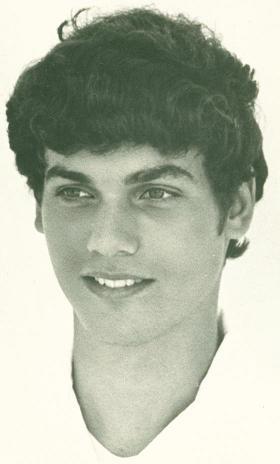


In memory of First Lieutenant Lior Yonatan
Birn in Kibbutz Sarid, 26th of Tammuz, 5712 (July 19, 1952). Fell in Egypt, 10th of Tishrei, 5734 (October 6, 1973)
The love of nature and of man was very present in the life of Lior Yonatan. It is also present in the clip in his memory, which immortalizes the moment in which he insists on saving a snake.
Lior was born on July 19, 1952 to Tsafira and the poet Natan Yonatan and grew up on Kibbutz Sarid. On his birth, his father wrote the poem “A Flower of Light”.
In the army, Lior served in the armored corps. He was sent to an officer training course and became the commander of a tank unit. His soldiers described him as a “friend”: they recounted how they made few requests to him because they knew that he would always find a way to fulfil them. He was ready to help in any way and to switch leave or guard duty with them.
 Lior Yonatan Z"l |
Since childhood, Lior believed that the protection of animals was one of the highest values. His friend told a story that when they were young they would catch snakes, but Lior always insisted on not killing them, but rather taking them somewhere else and letting them go.
Lior also loved photography. He took many pictures of nature and landscapes that capture everyday moments of beauty, such as sunsets and sunrises.
Lior was killed in the northern sector of the Suez Canal during the early hours of the Yom Kippur War, on October 6, 1973.
Natan Yonatan used to say that in the years prior to the war he lived in constant fear of an impending disaster, as if he felt the loss that was awaiting him. After Lior’s death, he wrote many poems about the experience of bereavement and the longing for his son.
Interview with Ziv Yonatan, younger brother of Lior Yonatan z”l, who talks about Lior's unique world
Thoughts from the artists Shuli Tajar and Gal Haklai who created the film
When we were first exposed to Lior’s story, we felt an immediate connection with him. He had a unique and sensitive perspective, which charmed and moved us. We felt that this should not be a “standard” film. It was important that it provided a poetic experience.
We learned from Tsafira, his mother, that Lior believed that hurting animals is an unforgivable act. We both really connected with that. The fact that he was protective even toward snakes—animals that most people don’t like—touched our hearts and we decided that that would be the framework of the clip. Lior differs from his friends since he saves the snake. He doesn’t see any reason to kill it and so he rescues it. In our view, this is an expression of his love for animals and the value he attributed to life in general.
Lior very much loved to hike. He loved nature and landscapes. He had a special way of looking at nature. It was important for us that nature should be particularly present in the clip. The camera in the clip is another “actor”—a kind of entity/nature: sometimes it is Lior, sometimes it is a snake and sometimes it is the wind, something that changes with the music. In addition, it was important for us to give expression to his unique view of life, both on the macro and micro levels: landscapes, sunrise, sunset, space, insects.
Lior loved music, so we decided that music would be an integral and important part of the animation. Lior was a great fan of the singer and composer Shlomo Grunich and we decided to use Grunich's music in the clip. The abstractness of the music connects with the rhythm of nature and the dreaminess and sensitivity that was so unique to Lior.
The creation of the film was a moving and emotional experience for us. It was a privilege to be part of such a meaningful project. There is something scary and necessary about such a sensitive topic and we are hopeful that our visual interpretation and the experience created by the clip convey at least a small part of who Lior was.